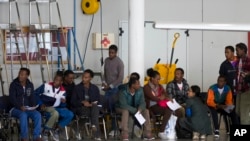Eritrea reserves some of its harshest criticism for Western nations and often has strained or hostile relationships with its neighbors. So it may come as a surprise that Eritrea is improving its ties with the European Union.
Evidence of this is in a program known as the 11th European Development Fund, which may allocate $229 million over the next six years for projects in Eritrea relating to renewable energy, energy efficiency and economic governance.
The allocation has not been finalized and the money has not been released, officials stress. But in recent years, the program has funded small-scale projects in Eritrea, including using solar panels to power irrigation in rural areas, and has supported community courts to improve the legal system.
Christian Manahl is the head of the European Union Delegation to Eritrea. “Concerning the relations between the European Union and Eritrea, we have had difficult times, but in the last couple of years, the relations have improved considerably," he said. "We have a solid cooperation program which is ongoing now."
Although the EU has funded projects in Eritrea since independence in 1993, when the work focused mainly on post-conflict reconstruction, Eritrea suspended its cooperation with the EU in 2011, a year when it expelled nearly all foreign aid agencies working in the country.
Manahl says the Eritrean government has since reviewed its position. "I am convinced the government has come to the opinion that we can have a mutually beneficial relationship based on the cooperation program that we can agree upon on both sides," he said.
EU Wants to Investigate Alleged Abuses
The two sides do, however, continue to have disagreements. One of these is Eritrea’s continued refusal to allow U.N. representatives to investigate allegations of human rights abuses.
A U.N. Commission of Inquiry and Human Rights recently accused the government of extrajudicial killings, forced labor and stifling free speech and freedom of religion. Groups like Amnesty International, Reporters Without Borders and Human Rights Watch have documented similar abuses and harshly criticized the government for years.
Eritrea has long rejected the allegations, and criticized the commission’s report for relying on politically-motivated testimony instead of independently conducted research.
Manahl says the EU delegation regrets that U.N. investigators have "not had the opportunity to visit the country." He said he and other EU officials believe that "anybody who visits the country is in a better position to give a more objective, a more complex picture of the reality here."
"We do have, of course, a dialogue with the government of Eritrea on human rights issues," he adds. "This is an important part of European foreign policy and it is in Eritrea as it is in any other country.”
Stable Eritrea = Fewer Migrants
The EU has a vested interest in seeing Eritrea stabilize. Along with Syria and Afghanistan, the nation is one of the top refugee-producing countries in the world , and hundreds of thousands of migrants have ended up on European shores or died crossing the Mediterranean Sea.
A spokesperson for the EU said development assistance will be all the more important if Eritrea abolishes life-long military service and young people are able to join the job market. “We must offer them an alternative to fleeing the country, with all the dangers it involves,” she said.
Similarly, EU Commissioner for International Cooperation and Development Neven Mimica of Croatia believes investing in Eritrea is money well-spent by the EU. "We need to assist people with concrete programs that address concrete needs of the people,” Mimica said in an email to VOA.
Manahl stressed that economic progress in Eritrea will be a stabilizing factor for the region and European countries.
“It is in our interest and it is in the interest of Eritrea that the young people have a perspective here for their future and that we create conditions that they stay here in their country," he said. "We have nothing against migration, but we would like to have migrants who leave in channels that do not expose young people -- actually thousands of young people -- to consider the risks on the journey to Europe."




